

Routledge Great Economists: Marx & Smith. History of Economics Playground. Economists' macro stories The last straw in the enduring blog debate over microfoundations has taken a decisive historical turn.
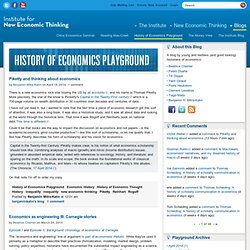
Last December already, Paul Krugman gave his own account of how microfoundations came to be the 70s, and why they unduly spread over subsequent decades, and so did Stephen Williamson. Economists' need to ground their methodological debates into self-made historical narratives is in itself an interesting feature for historians. But in a recent post dealing with the “Faustian bargain” New Keynesians may have sealed by endorsing of the New Classical microfoundational program, Simon Wren-Lewis asked a more direct historical question: Is this how it happened? And Noah Smith added a second one:
Economic thought in the 20th century. Reviewed: The Locust and the Bee - Predators and Creators in Capitalism’s Future by Geoff Mulgan. The Locust and the Bee: Predators and Creators in Capitalism’s Future Geoff MulganPrinceton University Press, 344pp, £19.95 “Capitalism,” writes Geoff Mulgan, “is not so much an aberration as a step on an evolutionary path, and one that contains within it some of the answers to its own contradictions.”
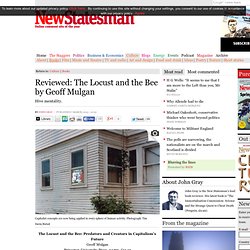
In thinking of capitalism in this way, Mulgan voices a contemporary consensus. As advances in biology and genetics have promoted the belief that economic and political development can be understood in evolutionary terms, hundreds if not thousands of books have appeared in recent years claiming to explain the rise and development of capitalism as part of an ongoing process of social evolution. This is not the first time that the idea of evolution has been invoked in this way. Owing more to Engels than Marx, who knew too much about history to imagine that it could be understood in Darwinian terms, there has long been a Marxian tradition that sees capitalism as a stage in social evolution.
The History of Economic Thought - Reading... Under construction... Classical political economy. Economics + sociology = love? If you look at the list of department chairs here at Indiana, you’ll notice that the first few were chairs of “economics and sociology.”
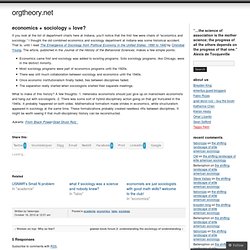
I thought the old combined economics and sociology department at Indiana was some historical accident. That is, until I read The Emergence of Sociology from Political Economy in the United States: 1890 to 1940 by Cristobal Young. The article, published in the Journal of the History of the Behavioral Sciences, makes a few simple points: Economics came first and sociology was added to existing programs. Solo sociology programs, like Chicago, were in the distinct minority.Most sociology programs were part of economics programs until the 1920s.There was still much collaboration between sociology and economics until the 1940s.Once economic institutionalism finally faded, ties between disciplines faded.The separation really started when sociologists started their separate meetings. What to make of this history?
Adverts: From Black Power/Grad Skool Rulz. Historical Echoes: What’s in a Name? The Sveriges Riksbank Prize in Economic Sciences in Memory of Alfred Nobel. Amy Farber, New York Fed Research Library.
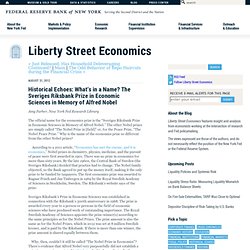
Why Don’t People Want Full Employment? Michal Kalecki’s 1943 Essay on Politics and Ideology. By Michal Kalecki* 1.
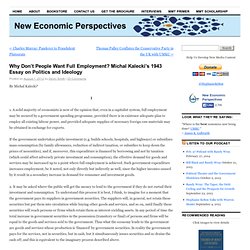
A solid majority of economists is now of the opinion that, even in a capitalist system, full employment may be secured by a government spending programme, provided there is in existence adequate plan to employ all existing labour power, and provided adequate supplies of necessary foreign raw-materials may be obtained in exchange for exports. If the government undertakes public investment (e.g. builds schools, hospitals, and highways) or subsidizes mass consumption (by family allowances, reduction of indirect taxation, or subsidies to keep down the prices of necessities), and if, moreover, this expenditure is financed by borrowing and not by taxation (which could affect adversely private investment and consumption), the effective demand for goods and services may be increased up to a point where full employment is achieved. 2.
It may be asked where the public will get the money to lend to the government if they do not curtail their investment and consumption. 3. 2. Prof. Jan Toporowski (SOAS) - Michał Kalecki and Oskar Lange in the 21st Century. James K. Galbraith: The Final Death (and Next Life) of Maynard Keynes. "John Maynard Keynes" by Steve Hunnisett on flickr Posted below, with kind permission of the author, is the transcript (see note below) of James K.

Galbraith’s keynote lecture to the 5th annual “Dijon” conference on Post Keynesian economics, meeting at Roskilde University near Copenhagen, Denmark on May 13, 2011. Please see the source link at UTIP for the audio, which I highly recommend. — selise It’s of course a great privilege for me to be here in this role and especially on the occasion of the 75th anniversary of the publication of the General Theory. Two years ago, as you may recall, our profession enjoyed a moment of ferment. The apogee of this moment was the publication in the New York Times Sunday Magazine of Paul Krugman’s essay, How The Economists Got It So Wrong. And I must say, looking out on this audience, it would be fair to say that there were more than just a few and it’s a pleasure to be here among you. In keeping with mainstream practice, Krugman named almost nobody.